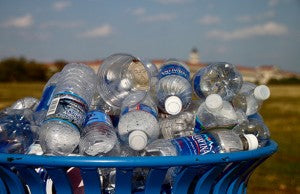Is Your Bottled Water Habit Killing The Environment?

The green movement has been around for long enough that it has gone from a niche interest to a worldwide phenomenon. The added awareness to practical environmental issues has provided bridges between die-hard hippies from a bygone era to the more economically-minded folk. Yet there are still some glaring dissonances between the people that simply say they care about the environment and those who actually do something about it. You hear about going green from a wide range of companies, including soft drink corporations, retail giants and construction manufacturers; there are now hybrid vehicles and greenhouse gas credits.
But in our obsession with saving the world have we actually been swindled into only thinking we're being more environmentally friendly? In particular, consider the absurd amount of bottled water that is purchased every single day. Is this because the quality of bottled water is better than what we can get at home, or is it simply more convenient? It may be possible that our obsession with bottled water could actually be doing much more harm than we have considered. Oh, The Plastic! Did you know that as many as 1,500 plastic water bottles are consumed in the United States every second? This adds up to 50 billion bottles being used per year. That is an incredible amount!
Despite the fact that recycling programs exist, the vast majority of these (about 80%) end up in a landfill. The plastic then takes several hundred years to disintegrate. It doesn't take an expert to realize the dire consequences this can have on our planet's health. Where Does The Water Come From? An even more startling realization is that the water that comes in these bottles is largely unregulated by any health group and thus suffers from a wide variety of contamination. The bottled water industry in the United States largely regulates itself. This means that companies test water only as often as they feel. Unfortunately the bottled water industry does a very poor job of regulating itself. City water gets tested many times per day, as much as once per hour. If any life-threatening chemicals are found, the whole system is shut down to fix the source of contamination. But third-party testers have found very dangerous particles in bottled water. These include:
- arsenic
- large amounts of bacteria
- fertilizer residue
- plastic chemicals leeched into the water
- dissolved medication
The bottled water industry is very unregulated and dangerous not only for the environment but for the drinker. The Real Green Solution The fact of the matter is that if you truly want to have a green source of water you will have to do some work yourself. Municipalities do their best to clean water within limits that will prevent the spread of infectious diseases. However, they do miss the mark sometimes. High levels of chlorine, fluoride, and other chemicals commonly added to water have been found to have very negative health consequences. The best solution is to filter water on your own using an in-house filtering system. The cost of these systems is quickly offset by no longer purchasing bottled water. Think of the amount of money you spend on bottled water versus having a reusable bottle at home. Reverse osmosis systems are very affordable, remove many harmful chemicals and pharmaceuticals.
Go Green If you truly want to be environmentally friendly, install an in-house water filter. When buying bottle water, you're paying a premium to destroy the environment as well as receive a low-quality product.






1 comment
Your claims about the regulation and safety of bottled water are inaccurate and misleading. While we continue to encourage more recycling, the recycling rate for bottled water containers is actually 39%, twice what at you claim.
Your statements that bottled water is unregulated, unsafe, and dangerous are patently false and completely unfounded. Please remove them immediately.
Bottled water in the United States is strictly and comprehensively regulated by the US Food and Drug Administration (FDA). To learn the facts about bottled water, please visit: http://www.bottledwater.org/education/regulations
Leave a comment
Please note, comments need to be approved before they are published.